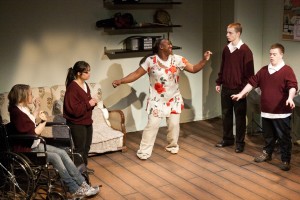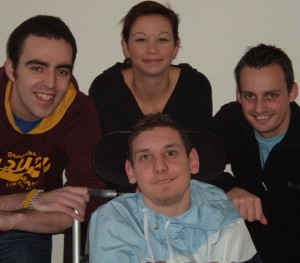An authoritative analysis in today’s Society Guardian of the deepest spending cuts in a generation, which start from Friday. The special issue inludes some sector by sector breakdowns of savings and job losses, including pieces I contributed to the in-depth coverage.
Category Archives: Learning disability
The cuts – an alternative
For those who’ve not already seen it, this powerful film presents an alternative to the government’s devastating cuts agenda. It features community groups and anti-cuts campaigners along with Bill Nighy, Radiohead’s Ed O’Brien and Zac Goldsmith MP. Worth watching ahead of this weekend’s demo in London against the cuts.
It Cuts Both Ways…The Alternatives from Oonagh Cousins on Vimeo.
Fiction based on fact; theatre explores the threat to special needs provision
Art mirrors life for those of us with an interest in learning disability issues as a London play explores the threat to special needs schools. The play coincides with the government’s plans to overhaul special educational provision and comes at a time when learning disablility support is in jeopardy thanks to public spending cuts.

Death of a Nightingale runs at Hampstead’s New End Theatre until Sunday 3 April and focuses on the inclusion agenda which can shoehorn children with special needs into mainstream schools that offer inadequate support.
The play, written by Alan Share, a former chair of governors at a special school, also addresses the problems when a special school is threatened with closure. Since 1997, more than 100 special schools have closed, resulting in the loss of about 9,000 places for children.
Professional actors are joined on stage with learning disabled young people from the Oak Lodge School in East Finchley. The cast includes 18-year-old Max Lewis, an actor with Downs syndrome who appeared in Notes on a Scandal. Lewis plays a pupil who truants from schools that fail to meet his needs.
Written in 2009, the play is being resurrected to coincide with the government’s green paper on special educational needs. Share describes the green paper as “yet another missed opportunity for the government”. He adds: “It wants to find a quick fix for children with moderate learning difficulties and avoid the challenge of meeting more complex and varied needs.”
For more on the green paper and special educational needs provision, check out the very good Guerrillamum blog.
Brighton Marathon’s first wheelchair-using participant
Award-winning sports enthusiast Adam Hayes has already won medals at boccia events, a target ball sport similar to petanque and bowls. As a keen footie fan and Chelsea supporter, the 20-year-old also enjoys a bit of hockey and football too. So it’s no surprise to his mates that he’s participating in the second ever Brighton Marathon next month.
Not only is Adam adding another string to his sporting bow, but he’s making history – Adam will be the first participant in a wheelchair to complete the 26-mile course.
I heard about about Adam after I wrote about the bureaucratic wrangle involving a housemate of his at Fethneys, the Leonard Cheshire Disability home he lives in Worthing, West Sussex.
Joining Adam on the start line on April 10th and pushing him along the course will be three Fethneys care staff, Gavin Parrish, Ollie Orchard and Lucie Hammond.

Adam Hayes, seated, the first wheelchair participant in the Brighton Marathon , pictured with (l-r) marathon teammates Ollie, Lucie and Gavin
The foursome is aiming to raise a target of £2,000 for Fethneys, which accommodates 10 young disabled people at a time, teaching them life skills like cooking, managing bills or cleaning and supporting them towards independent living.
“I feel very honoured to be the first wheelchair user in the whole of the country to take part in the Brighton Marathon,” says Adam. He adds of his boccia playing, “I competed in the GB championships and have won medals in regional and national athletics competitions. I also take part in wheelchair hockey and wheelchair football as a hobby.”
Moving into Fethneys five months ago from a local specialist college for disabled people, Adam says he loves his new home: “The staff here are teaching me the skills I need to live totally independently. Thanks to Fethneys I am really looking forward to living in my own flat in the near future – they are helping me to make my dream become a reality.”
To sponsor Adam, Lucie, Gavin, and Ollie visit their fundraising page.
Leonard Cheshire Disability has places on the 10 mile Great South Run on 30 October 2011. Contact the events team at events@LCDisability.org,
Digital switchover boss pledges help to the hardest to reach
Peter White must be the only chartered accountant in the country with a corporate slogan that could belong to a social exclusion charity – “Nobody left behind” – a clutch of charity partnerships under his belt and a network of neighbourhood activists whose grassroots knowledge helps him do his job. Read my Society Guardian interview here with Peter White, the head of the BBC’s digital switchover scheme who is trying to ensure nobody is left with a blank TV screen.
Learning disability: real freedom means freedom of movement
Real freedom, as Mary Pearson, mother to a learning disabled young person, says in the short film below, requires freedom of movement.
The film, by David Herman of the learning disability charity Camphill communities , is part of the ongoing campaign to help disabled people in care who want to live more independently but who are being prevented from doing so by funding wrangles between local authorities.
The cuts agenda combined with local government red tape means forcing vulnerable people (and their families and carers) through hoops if they want to move from one council area to another – and there’s no guarantee of success if you attempt this. But learning disablity campaigners are calling for funding to follow individuals. A sort of portable personalised budget and assessment system is what’s needed.
The film is part of the charity’s submission to the government-appointed Commission on the Funding of Care and Support which is due to report back in July. The scenes here offer a snapshot of the sort of rich community life that my sister is thriving in at The Lantern Camphill community.
Disco dreams: dance nights with a difference
Liz Astor, mother to 18-year-old Olivia, who has autism, realised how desperate her daughter was to socialize on nights out with her peers when, in response to being offered a packet of dates to snack on, the teenager blurted out (entirely seriously and with great indignation): “I want to go on a date! I don’t want to eat one!”
Many similarly amusing moments tinged with a serious edge have been enjoyed in my family thanks to my youngest sister’s grappling with the vagaries of the English language and her inability to take words anything other than literally.
There was the time she stormed home from school, complaining that she had been told to “puck off!” in the playground. My mother was caught between the pedant’s reaction of correcting my sister for mishearing the word (“Actually darling, it’s not ‘puck off’ it’s…”) and an anger-fuelled desire to advise her to tell her potty-mouthed peers to puck right off back (coining a new breed of Shakespearean insult in the process perhaps?). Instead, we checked there was no bullying involved and told my sister to maintain a dignified silence.
The silent treatment shut those stupid playground puckers right up, I can tell you.
I digress. Thanks to her daughter’s literal take on the date conversation, Liz Astor realized how much Olivia wanted to enjoy the sort of nights out her mainstream peers take for granted.
Spotting a gap in provision for young autistic adults in her local area on the Surrey-Kent borders, she launched a not-for-profit group, Disco Dreams, late last year. The specialist nights in a community hall in Oxted, Surrey, are aimed at 18-30-year-olds with autism or moderate learning difficulties. “Why shouldn’t young people with autism have the same opportunities as others their age?” asks Liz.
Autism charities offer vital support for the autistic and their families, and there’s some great work being done by inclusive arts charities, but even without taking into account the fact their future is under threat in the funding cuts, opportunities for young adults with autism to socialise is patchy around the country.
The Disco Dreams nights are tailored specifically for those with autism; the DJ is aware of when noise levels overwhelm the young people, a chill-out zone provides a quiet space and entry is £10 but free to carers.
Aside from the social benefits, the positive impact of music, exercise and dance in relation to a host of health-related conditions is well-documented. For example, there was a great BBC documentary last year, Autism, Disco and Me, which showed how disco dancing transformed a young autistic boy’s life
Back on the Kent-Surrey borders, the next Disco Dreams night is scheduled for tomorrow night, Friday 21, if there is enough interest (email discodreamsdance@gmail.com for more information). The whole project is funded entirely by Liz, Lady Astor of Hever. Plugging a gap in provision in this way is very big society, but not every community is lucky enough to have such philanthropic verve in its midst. Let’s hope the venture is successful and inspires similar events elsewhere, so Olivia gets to eat her date and have one too.
Why everyone should support One Month Before Heartbreak
I’m supporting the two-day online campaign, One Month Before Heartbreak, that took place this weekend against planned reforms to Disability Living Allowance (DLA), the disability benefit that allows tens of thousands of disabled people to get out and about from residential homes. The DLA consultation period ends on February 14th, Valentine’s Day.
In the words of blogger Brianb: “Many of us, concerned at the way the coalition government is bullying, victimising, stereotyping, abandoning and, stigmatising those of us who live with disability, have decided to publish blogs almost simultaneously to draw attention to these injustices being perpetrated”.
Given the warm glow the government wants to create with its big society approach, the cut seems even more unfair, and shortsighted, and as The Guardian’s David Brindle has highlighted, the cut is not only “the meanest and nastiest cut of all in the carnage that is sweeping through our public services” but is based on flawed reasoning.
Although individual campaigning organisations within the disability sector might have a history of being vocal, as a whole, individuals with disabilities and their carers aren’t much known for taking off their gloves and sticking their heads above the parapet. Until now. A huge, vibrant and persuasive online community of writers and campaigners is fighting injustice through blogging and on twitter.
As blogger Ned Ludd Carer points out, the cuts are “about locking up disabled people in their own homes and taking away the desperately needed care…This doesn’t have to happen. We need to stop these cuts before they do any more damage. We carers need to get our heads out of the sand and start shouting. We need to stop being the silent, heroic martyrs the press and TV love to wheel out for a nice heartwarming end to the programme. We need to be Carers With Attitude.” The gloves are off.
Arbitrary Constant has highlighted the main concerns for the disabled while you can also read Community Care’s blog for a litany of cuts that hit the vulnerable.
Anyone in two minds about supporting the campaign – and there are already 2,500 names on the online petition to recall the consultation – should read blogger Bendy Girl who argues that the cuts should be everybody’s business, not just an issue for the disabled and their carers.
As the One Month Before Heartbreak campaign stresses, 100 years ago “disabled people were institutionalised and kept out of the public eye so that the public would need not feel embarrassed to look upon a disabled person.” The removal of DLA will trap the disabled in their care homes. And that’s something best consigned to the history books.
Autism lifelines at risk of unravelling
It is Saturday morning and 13-year-old James Hope is desperate to get to his activity club. His dad, Jim, reaches for his coat, but James is frustrated at having to wait. He stomps off to the car and waits silently, brows furrowed.
This scene takes place most Saturdays but rather than tiring of what other parents might regard as a mild teenage strop, Jim and his wife, Alison, celebrate it. James has autism and they are grateful that their son not only has a regular weekend activity but that he is keen to get to it.
But the kind of lifeline the Hope family relies on is under threat thanks to funding cuts. Click here to read my Society Guardian piece on how progress on autism is at risk.
Are we losing the care in our communities?

People found themselves discharged from hospitals into small group homes in virtually every town in the UK. These were shared houses registered as care homes operating effectively as shared supported housing in the days before the supported living drive but without the important security of a tenancy. For many it felt like not only a new life, but a better one.
But now, just as people are looking forward to enjoying this life, due to bureaucratic, regulatory and financial reasons, people are trapped in unwanted small registered care homes. These homes are now closing because of running costs or the need to meet national minimum standards and changes in commissioning practice which prefer supported housing over ‘care homes’.
The problem is these closures are not happening in a strategic or orderly way, so the people living there face the prospect of another move into the unknown.
Take John, for example. He has a complex disability and moved from a long stay institution in 1986 to live in the community. His funding came from the council (let’s call it council A) where his parents lived although his new home was based in a different local authority area (council B).
In 1990 John moved to a smaller house, still registered as a care home (as it was before the supported living options became available), but less rural and with more to do in the community. The new house was still based in council B’s area and the funding arrangements continued.
Over the last 15 years John and his housemates have enjoyed a settled and fairly contented life building up their local support networks. Recently, two of the other people living there have moved on, leaving behind John and a fellow housemate, Mary (she is funded by council C).
The problem is that the charity that runs the home cannot find new people to move in to fill the vacancies – it has continued to run the service at a loss for the past two years.
The inability to find people to join John and Mary has been largely due to the understandable reluctance of authorities to make referrals to registered care placements.
As a solution, the charity could de-register the accommodation so it is no longer classed as a care home, but if it does so, it will come up against two bureaucratic barriers. Firstly, local government ‘ordinary residence’ rules mean council B would have to take on the support costs for John and Mary (while councils A and C would relinquish all funding). Secondly, council B is reluctant to open up its procurement arrangements to recognise the charity as a preferred contractor so will not place people there under contract for supported living!
Unknown to John and Mary, the home is likely to close and they will be faced with a move back to authorities A and C, a part of the country they haven’t lived in for over 20 years where not many family members remain. The costs to authorities A and C are very likely to increase while authority B will lose a good resource that could meet local needs.
The Voluntary Organisations Disability Group (VODG) researched the issues affecting people with disabilities because of the Ordinary Residence rules in 1997.
Our 2007 report titled No Place Like Home recommended three actions: firstly to agree the principle of a person-centred approach to funding and placement, secondly for the government to issue guidance and thirdly to put in place a framework for funding to transfer between authorities.
In October the VODG published Not in My Backyard as a follow up and found that despite the fact that new guidance had been issued there was little evidence of good practice. VODG demands the government include the concept of portability of social care entitlement in the white paper on social care due to be published next year.
We must do right by people like John and Mary; they represent a particularly wronged generation of people. Regardless of promises for future reform we need a kind of national amnesty, one that ensures funding is in the right place, providers and commissioners are working in partnership and individuals are given a proper voice. Because putting people first is not just a one off action, it is an enduring commitment.
